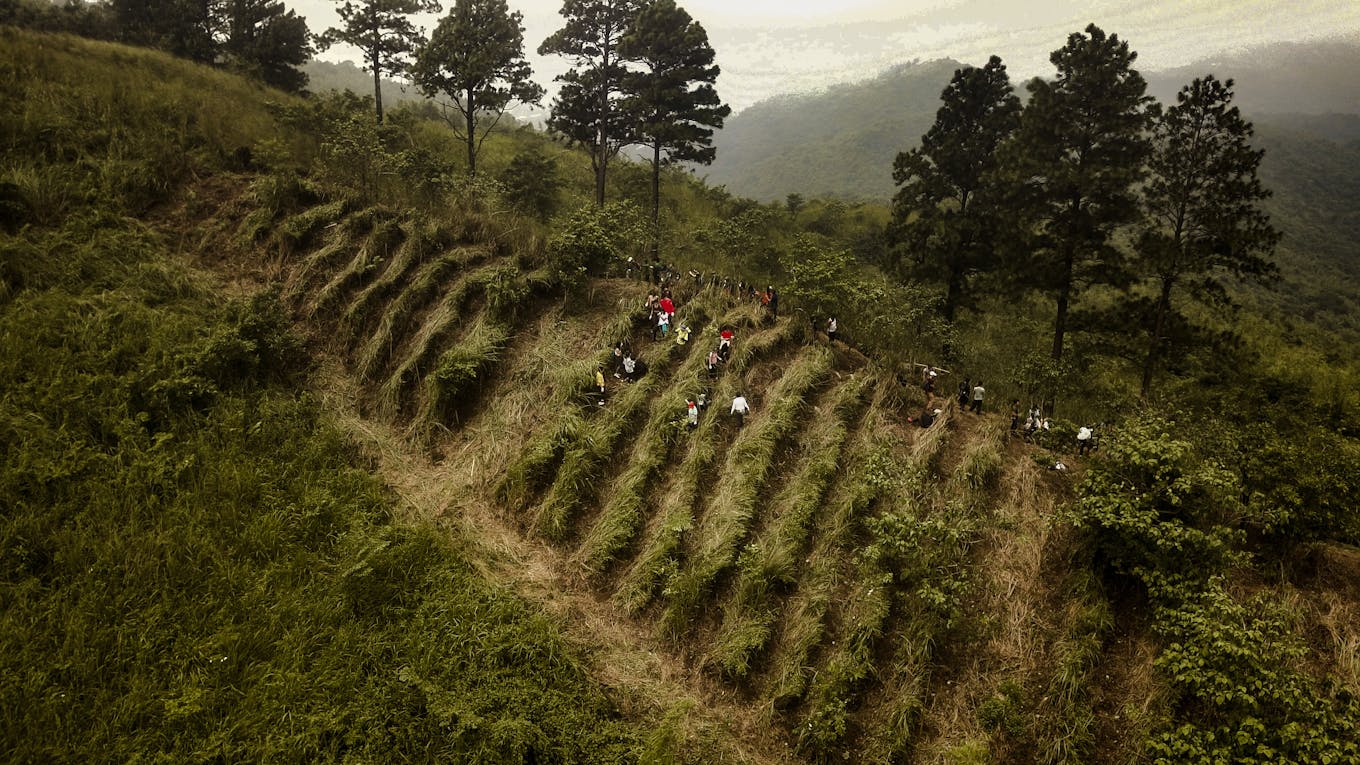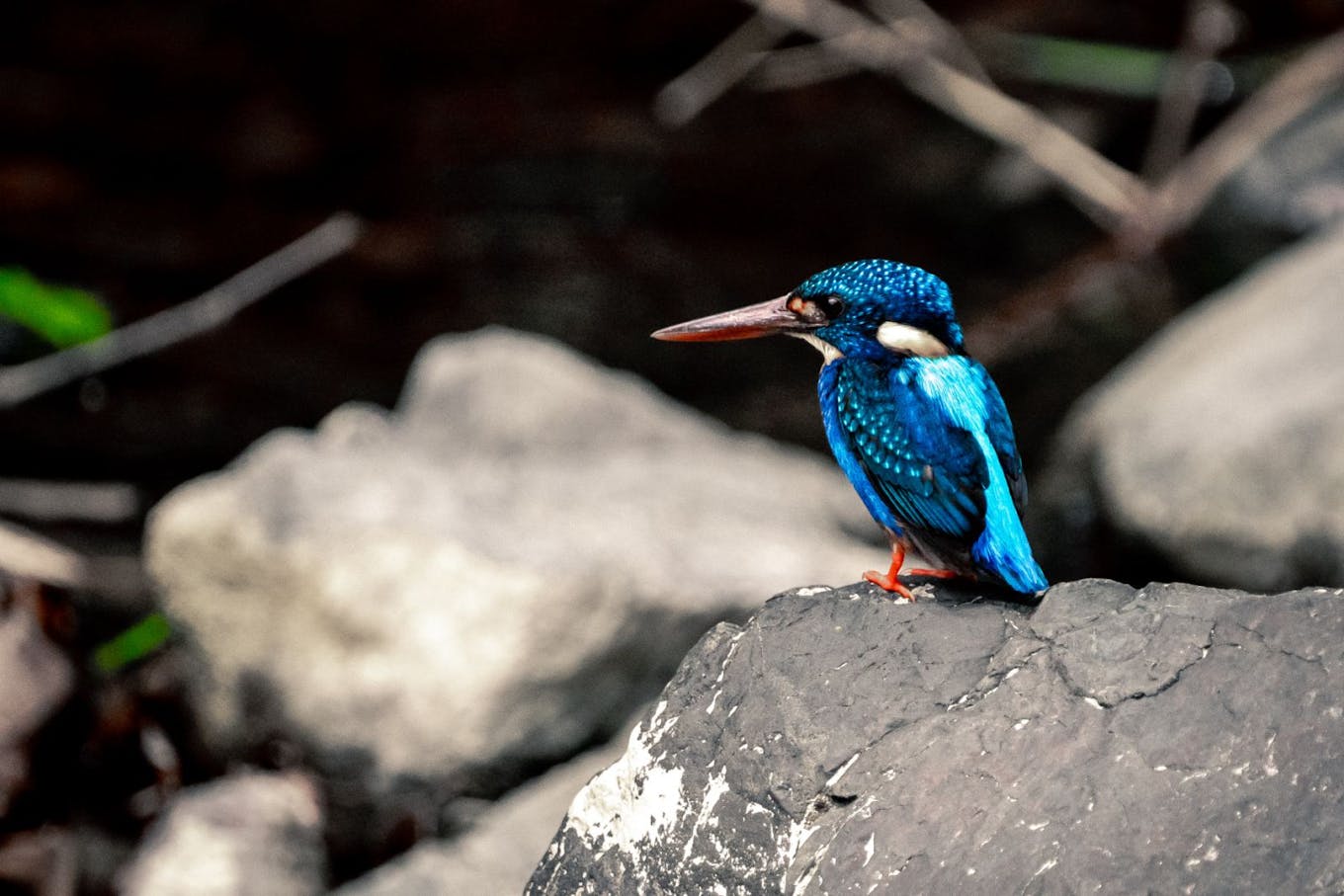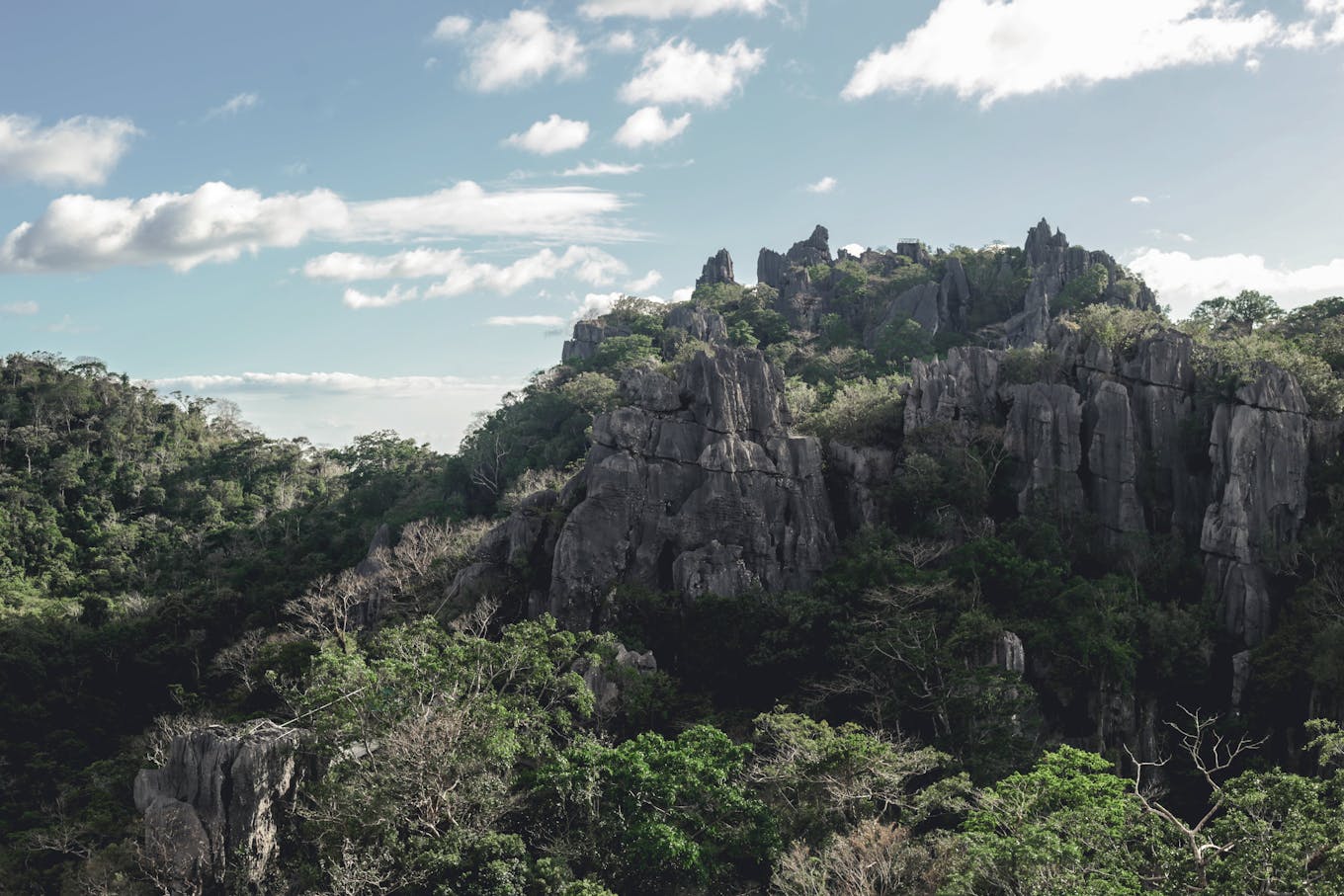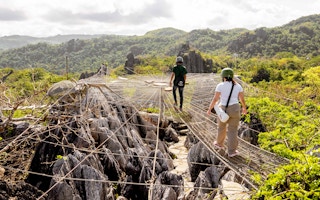Environmental defenders have come under attack in the Philippines as officials from a corrections facility have asserted their right to build a new headquarters in a protected sanctuary.
To continue reading, subscribe to Eco‑Business.
There's something for everyone. We offer a range of subscription plans.
- Access our stories and receive our Insights Weekly newsletter with the free EB Member plan.
- Unlock unlimited access to our content and archive with EB Circle.
- Publish your content with EB Premium.
Campaigners from the Masungi Georeserve Foundation, a non-profit working to protect a conservation area in the southern Sierra Madre range east of Manila, were confronted by some twenty personnel of the Bureau of Corrections (BuCor) on 18 February, as they arrived at the geopark for an “ocular inspection” while brandishing a title claiming ownership to 270 hectares of the nature reserve.
Known for its distinctive limestone rock formations, the Masungi Georeserve is a geological park and conservation area that protects some 2,700 hectares of degraded forestland in the mountainous communities of Pinugay, Baras, Cuyambay, and Tandang Kutyo in Tanay, Rizal—some 50 kilometres east of Metro Manila.
Stakeholders of the Masungi Georeserve and its park rangers have faced consecutive attacks over the last two years. In 2021, two of the sanctuary’s park rangers sustained serious injuries after being shot at by suspected illegal loggers. Late last year, armed men occupied parts of the sanctuary allegedly intending to cordon off the Kaliwa and Marikina Watershed.
The latest attack comes just days after the Department of Environment and Natural Resources (DENR) confirmed the cancellation of three quarrying agreements that threatened to encroach on the Masungi Geopark Project and the Upper Marikina watershed to mine for limestone, shale, and other mineral deposits.
The orders signed by environment undersecretary Juan Miguel Cuna, and released to the Upper Marikina Watershed Coalition, confirmed the cancellation of the mineral production sharing agreements previously granted to Quarry Rock Group, Inc, Quimson Limestone, Inc, and Rapid City Realty and Development Corporation.
“After three years of campaigning, we look forward to seeing these cancellations enforced and reflected on the ground,” said the coalition in a statement. “The fight continues as some of the quarries claim vested rights within protected areas and reportedly maintain a presence on site. Harmful resorts and land grabbers… have also reportedly ramped up harassment against environment defenders and incursions into reforestation sites.”
The Upper Marikina Watershed Coalition is a network of over 60 environmental groups that champion the conservation of the Upper Marikina River Basin Protected Landscape (UMRBPL) in Rizal province. Its members include the Alyansa Tigil Mina, the Kalikasan People’s Network for the Environment, the Green Party of the Philippines, and the Masungi Georeserve Foundation Inc, among others.
The coalition noted that the mineral extraction agreements gave concessions for the exploitation of some 1,500 hectares of protected forestland inside the UMRBPL park.
“In the Philippines, there seems to be no concept of civil society and the private sector being able to actively participate in area-based conservation, unlike other countries like Africa that have utilised partnerships like this to double their forest cover and increase enforcement on the ground,” conservationist and Masungi Georeserve Foundation trustee Ann Adeline Dumaliang told Eco-Business.
“I think a lot [of the recent attacks] have to do with the activities we’ve been surfacing that have traditionally been allowed to thrive in this area even though they are illegal and incompatible with these zones,” she continued.
“
Many people still believe that land that is unbuilt is unused land, when in truth, as far as conservation is concerned, as far as protected areas are concerned, these are actually life-giving ecosystems that we all depend on.
Ann Adeline Dumaliang, trustee, Masungi Georeserve Foundation
Masungi Georeserve Foundation Inc founder Ben Dumaliang—Ann’s father—and his company, Blue Star Construction and Development Corporation, first inked an agreement with the Philippine government in 1996 to develop at least 400 hectares of the Masungi area into a housing project.
After discussions with then Environment undersecretary Antonio La Viña, however, the housing project would be scrapped as the DENR converted the land into a conservation park in 2000 and tapped Dumaliang and his company to be stewards of the reserve, with a mandate to rehabilitate the limestone forest.
“This land was committed to our joint venture project as early as the 2000s,” the geotourism advocate Dumaliang further highlighted. “In fact, it was supposed to be for housing, but upon recognising the opportunities this area presented and how awe-inspiring it is, [our organisation] decided that even if it means a lot of risk to shoulder and a lot of costs that will never be recovered, we still champion it as a protected georeserve.”
The Masungi Geopark Project would be further institutionalised under a landmark agreement between the DENR and Masungi Georeserve Foundation in 2017, championed by then environment secretary Gina Lopez.
According to Dumaliang, the Masungi Georeserve Foundation’s reforestation efforts have planted 100,000 native trees in the area since the start of the partnership. The green corridor is home to some 500 species of endemic flora and fauna, including the vulnerable Luzon Tarictic Hornbill and the Mottle-Winged Flying Fox.

The Masungi Georeserve is a geological park and conservation area that protects some 2,700 hectares of degraded forestland in the mountainous communities of Pinugay, Baras, Cuyambay, and Tandang Kutyo in Tanay, Rizal-some 50 kilometres east of Metro Manila. Image: Masungi Georeserve Foundation Inc
In a statement, BuCor acting chief Gregorio Catapang Jr confirmed plans to build a new headquarters of the Bureau of Corrections in the territory, as well as residential infrastructure for its personnel and employees, insisting that “being the registered owner of the subject property, BuCor has every right to conduct any activity in the area.”
Catapang asserted that the land’s title has been transferred to the BuCor by the Registry of Deeds in Morong, Rizal as of September 2022.
Masungi Georeserve Foundation has said BuCor’s move would have “expensive consequences” for the environment, also noting that the park’s terrain is “mountainous and geologically unbuildable.” The foundation would go on to underscore that the park is part of the Masungi Strict Nature Reserve and Wildlife Sanctuary and Kaliwa River Forest Reserve.
“The Masungi Georeserve is a symbol of sustainable development,” said senator Nancy Binay in a statement. “[They are] at the forefront of efforts to conserve, restore and improve the environment in the face of climate change, which must be protected by the government and private sector at all cost.”
“The University of the Philippines School of Urban and Regional Planning recognises the importance of improving the condition of our state prisons. However, there are critical environmental considerations in the selection of sites for the new facilities of the Bureau of Corrections (BuCor) that must be carefully studied,” said Dr Dina Magnaye Dean, dean of the University of the Philippines School of Urban and Regional Planning, in a statement.
Environmental groups have similarly stepped up to express support for Masungi Georeserve and its fight for conservation.
“BuCor’s plan not only endangers the natural resources of the Masungi Georeserve but also imperils the lives of vulnerable communities in the area,” said Youth Strike for Climate Philippines in a statement. “The unreasonable destruction of forests to give way for infrastructure that is not direly needed is untenable.”
The youth-focused non-profit said that Masungi Georeserve’s mountainous woodlands are part of the Sierra Madre Mountain Range which play a vital role in climate mitigation. Deforestation of the area to give way to construction may prove catastrophic to the already flood-prone adjacent lowland communities like the city of Marikina, according to the group.
In September 2022, the Masungi Georeserve faced threats of “force and intimidation” over the span of a few days, after armed private security personnel were discovered encamped in the sanctuary, allegedly intending to occupy parts of the Kaliwa and Marikina Watershed. The “invaders” would leave only after the Philippine National Police seized firearms from the group. The Senate has since launched an investigation into the incidents of violence and land grabbing in the Masungi Georeserve.

The Masungi Georeserve Foundation’s reforestation efforts have planted 100,000 native trees in the area since the start of the partnership. The green corridor is home to some 500 species of endemic flora and fauna, including the vulnerable Luzon Tarictic Hornbill and the Mottle-Winged Flying Fox. Image: Masungi Georeserve Foundation Inc
“It seems a lot are gunning for a share of the Masungi Georeserve… but the area should be protected from those who want to use it for self-interest,” ACT party-list representative France Castro told the media in a news briefing.
“We should be able to protect our environment and natural resources to pass them on to the next generation. We cannot allow the area to be exploited for the needs of the few today and have nothing left for future Filipinos,” Kabataan party-list representative Raoul Manuel told the media during a recent visit to the Masungi Georeserve.
Senator Binay and the Makabayan bloc have filed resolutions in the Senate and Congress, respectively, seeking an inquiry into the BuCor’s plans to build a new headquarters at the Masungi Georeserve.
The Save Masungi Movement has since launched an online petition calling on President Ferdinand Marcos Jr and DENR secretary Antonia Yulo-Loyzaga to intervene in the BuCor’s plan to encroach on the limestone ecosystem of the Masungi Georeserve.
“The multiple adversarial efforts against Masungi in recent months reveal a concerted plan to remove DENR’s faithful conservation partner from the picture,” said Masungi Georeserve Foundation in a statement, calling on the president and environment secretary to intervene.
”The Masungi Geopark Project is at the forefront of the Philippines’ climate change agenda to enable effective, nature-based solutions involving the private sector, civil society, and communities. Sabotaging Masungi goes against our nation’s sustainable development.”
“Many people still believe that land that is unbuilt is unused land, when in truth, as far as conservation is concerned, as far as protected areas are concerned, these are actually life-giving ecosystems that we all depend on, green infrastructure that’s worth saving and growing. It’s not simply unused land, there is value in protecting it as it is,” Dumaliang told Eco-Business.
Want more Philippines ESG and sustainability news and views? Subscribe to our Eco-Business Philippines newsletter here.

The development comes just days after the Department of Environment and Natural Resources (DENR) confirmed the cancellation of three quarrying agreements that threatened to encroach on the Masungi Geopark Project and the Upper Marikina watershed to mine for limestone, shale, and other mineral deposits. Image: Masungi Georeserve Foundation Inc










